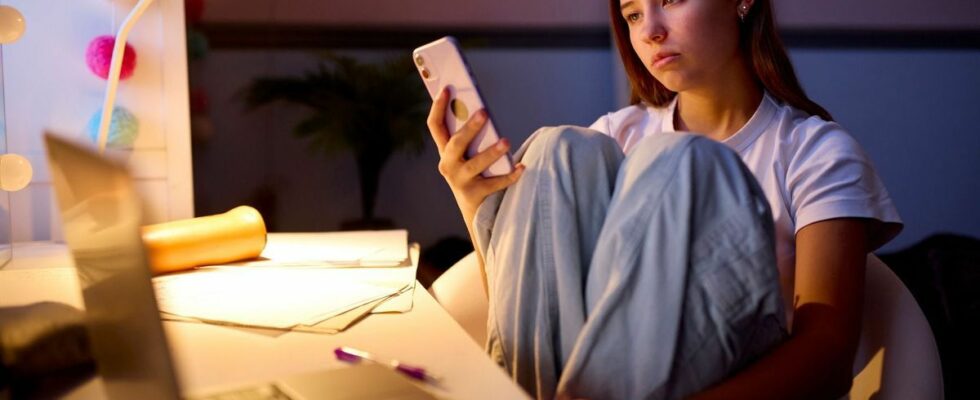Published on
updated on
Reading 4 min.
If puberty and entry into working life are pivotal periods for young French people (11-24 years old), women seem to be more vulnerable at this age and prey to worrying psychological distress.
On the occasion of the International Day for the Elimination of Violence against Women, Ifop and the IAMSTRONG coaching platform have published a extensive sociological investigation focusing on the psychological suffering of young French women. The worrying results highlight the impact of sexist remarks and the cult of appearance, which fuel their distress.
Suicidal thoughts much more common among young women
Although physical and sexual violence against women is now widely documented, psychological violence against women still too often remains ignored. To overcome this, Ifop, the leading actor in opinion studies in France, interviewed 1e as of October 9, 2024 1,303 young people aged 11 to 24.
Result ? The survey reveals firstly that the various gender-based violence to which women are subjected during their youth “have cumulative psychological effects that can be as devastating as physical violence.”
“The prevalence of suicidal thoughts is thus almost twice as high among girls (27%) as among boys (18%) from 11 to 24 years old, the gap between the two sexes being double among young people confiding in suicidal thoughts in the past 12 months“, reveals the investigation, before continuing “lA historical perspective of these results (…) shows an explosion in ten years of suicidal thoughts in the past year among young adult women (18-24 years old).“
Increased fragility in young women, which also manifests itself in other psychological symptoms, such as:
- to experience intense periods of anxiety (68%, compared to 51% among men);
- to experience depressive episodes lasting at least two weeks (55%, compared to 40% of men);
- to suffer from sleep disorders: 27%, compared to 18% of men.
- to be worried”without knowing why” (55%, compared to 38% of men);
- to have “unexplained headaches or stomach aches (42%, compared to 26% of men)”;
The direct consequence of these anxiety symptoms? Taking anti-depressants, for one in five young women (19%).
Homosexual/bisexual women even more affected
Another major observation from this assessment, drawn up by the IFOP: women who deviate from traditional gender norms, such as homosexual/bisexual women, seem to present increased psychological suffering.
“88% of homosexual/bisexual women report intense stress compared to 78% of heterosexual women. The paroxysm is reached among people questioning the very binary of gender: 94% of “gender fluid/non-binary” people present symptoms severe anxiety”, underlines the investigation.
The IFOP specifies that the “gender gap” which emerges from this study is symptomatic of the psychological damage that gender-based violence (sexual harassment, ordinary sexism, injunctions to physical perfection, etc.) can cause at a phase of life (puberty). where all vulnerabilities are exacerbated.
Self-devaluation, a popular trend
Unsurprisingly, young French women tend to devalue themselves.
“The tendency to self-deprecate actually turns out to be very gendered if we judge by the proportion of girls having “a negative opinion of themselves” (38%, compared to 26% of boys) or even by those who admit to being “afraid of not being able to do everything” (66%, compared to 50%), to being “very afraid of failure” (73%, compared to 54%) or to being “always afraid to deceive” (66%, against 48%)“, confirm the Ifop results.
- This tendency of girls to depreciate particularly affects their academic abilities. More than a third of girls (34%) compared to less than a quarter of boys (23%) indicate that they do not have confidence in their academic level, this proportion even rising to 38% among young gay, bi or pansexual girls.
- Likewise, many students doubt their ability to succeed in school or professionally (48% of girls compared to 32% of boys) or admit to being afraid “to speak in class” – felt by 51% of girls compared to 39% of boys.
- Finally, psychological suffering explodes, at this age, when we depreciate ourselves on a physical level. The proportion of young people who have already thought about committing suicide is in fact three times higher among young people who do not feel beautiful than among those who say they are beautiful.
Women, more rejected by society?
Still according to the survey, women seem to have a disillusioned and critical outlook towards society.
- Women therefore take a much harsher look at the opportunities available to young people to integrate into society. Only 48% of young girls think they have “lucky to live in today’s times“compared to 61% of men. And their pessimism reaches its peak among women”belonging to gender minorities such as homosexuals/bisexuals (68%) or non-binary people (76%).”
- The resentment of some young people towards the world around them is also more widespread among young girls. 68% of teenage girls aged 14 to 15 say today “disgusted by what they see around them” compared to 49% of boys of the same age. And this feminine uneasiness goes hand in hand with a more marked desire.to abandon everything” (32%, compared to 17% of men).
This survey, carried out among the fraction of women most exposed to gender-based violence, therefore has the merit “to remember that gender violence is not only in beatings: it interferes in everyday looks, derogatory remarks, micro-annoyances and other doubts which, instilled day after day, end up undermining the self-esteem and impair the mental health of women in alarming proportions”, conclude the Ifop experts.

